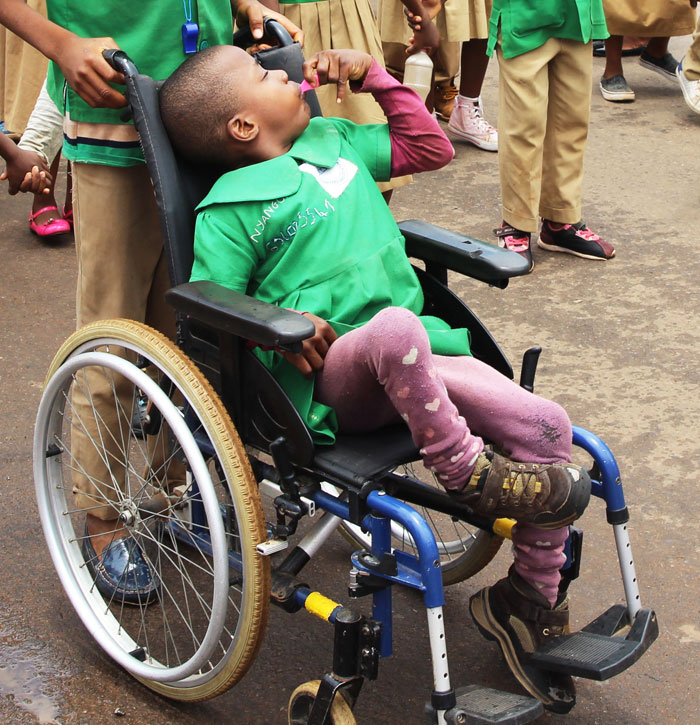CBC Health Services Champions Access to Education for Children with Disabilities
Children with disabilities across Africa and Cameroon in particular continue to face difficulties accessing education which is a basic human right. Most school buildings are still without ramps or lifts, toilets are generally not disability friendly, and school curricula do not take into account the learning needs of children with disabilities.
In fact, approximately 1 in 10 children living with disabilities in Cameroon has access to education. What this means is that 9 out of 10 children with disabilities still cannot access education.
Children with disabilities include those with mental, visual, mobility or physical, speech and hearing impairments. They are more often than not victims of a vicious cycle of disability and poverty that deprives them from education and livelihood opportunities.
As part of efforts to improve access to education for children living with disabilities, the Cameroon government decreed 68 government schools as inclusive ones. Other government measures include the training and recruitment of inclusive teachers and the signing (not yet ratified) of the April 2010 law on the promotion of the rights of persons with disability. However, the measures are not enough for the effective education of children with disabilities.
Joshua Mangele (pseudonym) is a primary school pupil in Yaounde. He tells us, “I want to go to school with them (children with disabilities), I want to eat with them, and I want to play with them.” He doesn’t have a disability but he is well aware of the fact that his peers living with disabilities still do not have access to education.
Gisel Andre Noyema, a child with a disability, says, “Parents should send their children with disability to school so teachers can care and teach them how to read and speak.” Gisel has repeated the same class several times but still keeps going to school and improving on her capacity slowly but surely.
A teacher in one of the inclusive private schools in Yaounde tells us that, “The difficulties they (children with disability) face in the classroom vary. Some are fast in writing, and others slow to understand. It’s usually challenging to go back and forth to ensure that all the children are at same level.”
Program Manager for Empowerment and Disability Inclusive Development (EDID) of the Cameroon Baptist Convention Health Services (CBCHS), Mrs. Agho Nee Tsangue Glory, explains that most of the few school curricula for children with disabilities are not well designed and that most schools are constructed with staircases making access very difficult for children on wheelchairs.

EDID Manager calls for Inclusive Education
Mrs. Agho was speaking during an international campaign organized by the Liliane Foundation and her strategic partner organisations around the world like EDID to raise awareness on the education of children living with disabilities dubbed ‘We Ring the Bell’ campaign.
She used the opportunity to call for the commitment of government officials in promoting access to education for children with disabilities. She equally encouraged school proprietors to make their school environments accessible. Mrs. Agho stressed on the need for parents of children with disabilities to love and give them access to opportunities and not hide or discriminate against them.
“We can’t reach the Sustainable Development Goals [SDGs] if children with disabilities are left behind. Countries are losing billions of potential income when persons with disabilities are not educated,” remarked Mrs. Agho.
During this year’s campaign government officials, parents, and school children, in the presence of the national and international media made the loudest noise for one minute to call on stakeholders to enact and implement laws in favour of children with disabilities.

Stakeholders pledge to make schools accessible
The Center Regional Delegate for Social Affairs, Edimo Mbappe Rachel says her Ministry is doing its best to put smiles on the faces of children living with disabilities in Cameroon.
Dr. Yonta Njoume, Sub-director for School Health at the Ministry of Basic Education, on her part, notes that basic education is compulsory for all children including those with disabilities.
Living with a disability is not a death sentence. The case in point is that of Shaseline NaZi, aged 27. Even though she has mobility impairment, through education she has been able to make her way to the Cameroon Radio and Television(CRTV) as a professional Journalist.
“Children with disabilities should know that having a disability is not death. God has blessed them with something special. They should move forward with confidence that they have something special to also offer in their communities,” advised Shaseline NaZi.
The ‘We Ring the Bell’ campaign now in its 4th edition held this year in Yaounde, Douala and Bafoussam on March 21, 2018, under the theme “Welcoming all children in school including children with disabilities.”
